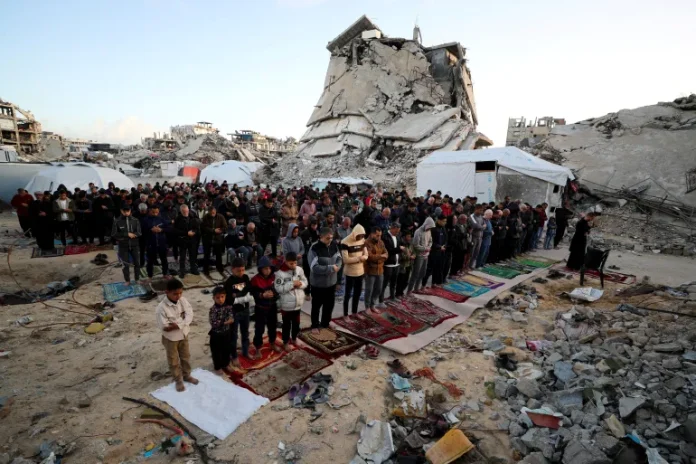Israel has cut off humanitarian aid, including food, fuel, medicine and other supplies, to the people of Gaza for the past four weeks.
According to the UN, agencies have cut food distributions to families in half, markets are out of most vegetables and many aid workers are unable to travel because of Israeli bombardment.
“We are totally dependent on this humanitarian box,” said Shorouk Shamla, a mother of three who picks up a monthly box of food for her family from the UN distribution centre in Jabalia in northern Gaza. She and her children are cutting back on their meals to ensure they have enough to last a month: “If this closes, who else is going to provide us with food?”
Humanitarian aid workers are stretching the supplies they have, but warn of a catastrophic spike in severe hunger and malnutrition. Food will eventually run out completely if the flow of aid is not restored, as the war has destroyed almost all local food production in the Gaza Strip, the UN said.
Attacks on the Holy Day of Eid al-Fitr
Israel continued its bombardment of the Gaza Strip on the first day of the Muslim holiday Eid al-Fitr, killing dozens of people, while Prime Minister Benjamin Netanyahu shows no sign of easing pressure on Hamas amid a new round of ceasefire talks.
Several airstrikes in the early hours of Sunday hit tents and homes as Palestinians celebrated the Eid al-Fitr holiday marking the end of the Muslim fasting month of Ramadan. At least 35 people were killed in the southern towns of Rafah and Khan Younis, medical sources told Al Jazeera.
Sunday’s killings came as the Palestine Red Crescent Society (PRCS) discovered the bodies of 15 medical workers in Rafah, which came under heavy Israeli shelling last week.
Fact-checking agency Al Jazeera Sanad obtained exclusive satellite images showing that at least five rescue vehicles were destroyed by the Israeli military in the deadly attack.
“[This] is a tragedy not only for us … but also for humanitarian work and humanity,” the PRCS said in a statement, adding that the Israeli military’s attack on health workers “can only be considered a war crime.”
Amid the violence, the humanitarian situation in the Gaza Strip continues to deteriorate as Israel has cut off aid to Gaza since early March.
“Palestinians are supposed to end their fast with a very delicious meal [for the Eid holiday], but today they can’t even afford one meal – the situation in Gaza is just horrifying,” said Al Jazeera’s Hind Khudari, reporting from Deir al-Balah.
Prospects for a ceasefire in Gaza remain remote
Meanwhile, prospects for a breakthrough in ceasefire talks seem remote. On Sunday, Netanyahu repeated his demand that Hamas disarm and its leaders leave Gaza, pledging to increase pressure on the group to release 59 remaining captives, 35 of who are presumed dead.
It is part of a new package of demands put forward by Israel, backed by US President Donald Trump, which is set to renegotiate the terms of a three-phase ceasefire agreement signed in January.
Under the original agreement, after the weekly release of the first batch of captives, both sides agreed to enter a second phase of talks to discuss a final end to the war, the release of the remaining prisoners and an Israeli withdrawal from Gaza.
But Israel insists that Hamas must release all prisoners without an Israeli commitment to end the war. With Hamas refusing the new demands, Israel has resumed bombardment of the Strip and redeployed troops inside the enclave.
Negotiations under fire
Netanyahu also said on Sunday that Israel would work to implement Trump’s “voluntary emigration plan” from Gaza, and said his cabinet had agreed to continue pressure on Hamas, which he said had agreed to a new ceasefire offer from mediators Egypt and Qatar.
A senior Hamas official, Sami Abu Zuhri, said Netanyahu’s comments were a recipe for “endless escalation” in the region. Netanyahu rejected claims that Israel was not negotiating, saying, “We are negotiating under fire and that is why they are also effective.”
“We see that suddenly cracks have appeared,” he said in a video message published on Sunday.
Khalil al-Hayya, a Hamas leader in Gaza, said the group had agreed to a proposal that security sources said included the release of five Israeli captives each week. But he said laying down arms as demanded by Israel was a “red line” that the group would not cross.
